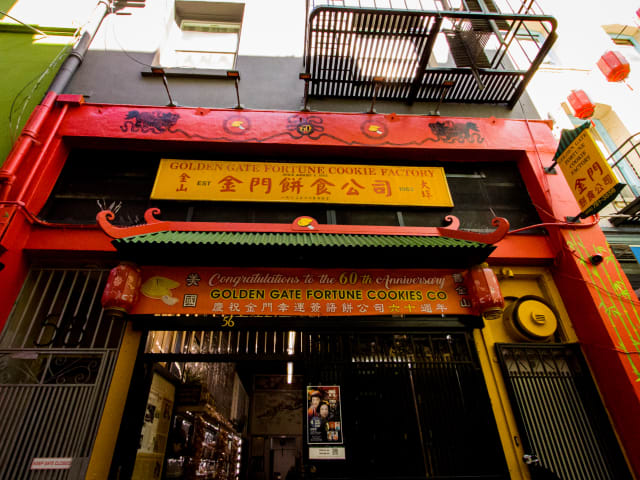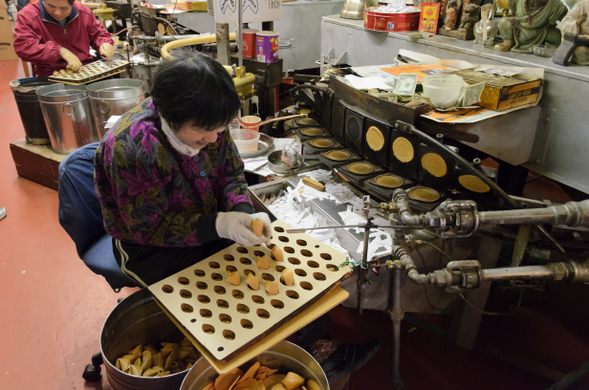Golden Gate Fortune Cookie Factory
Handmade fortune cookies, assorted flavors, custom fortunes, fresh samples
Handmade fortune cookies, assorted flavors, custom fortunes, fresh samples



































56 Ross Alley, San Francisco, CA 94108 Get directions
$
"This legendary Chinatown factory has been hand-making about 10,000 fortune cookies a day since 1962. Every time we come here, we're mesmerized by the large rotating cast iron griddles that achieve each cookie’s signature thinness and crunch. We usually opt for the green tea-flavored ones, or the chocolate-dipped, sprinkle-covered variety. You can also customize the messages inside for anything from party favors to love-of-your-life confessions." - megan zhang, julia chen 1, patrick wong

"The sweet smell of vanilla, sesame, and butter lures tourists to this small alley in Chinatown to watch workers make 10,000 fortune cookies a day (and pass out hot samples). You can customize your own fortunes, making a great souvenir for tourists and non-tourists alike, and you might learn a thing or two about history while you’re at it. Fortune cookies were essentially invented in San Francisco, made to be served at the Japanese Tea Garden in Golden Gate Park in 1918, but later picked up by San Francisco’s Chinese restaurants." - Dianne de Guzman

"In Ross Alley I ate my fortune at the Golden Gate Fortune Cookie Factory, a charming, playful stop while wandering Chinatown." - Becky Duffett
"In a pedestrian alley tucked into San Francisco’s Chinatown neighborhood, this tiny factory is one of the oldest producers of handmade fortune cookies in the United States. As other producers turn to automated labor, it is one of the last of its kind, and it’s in trouble—but not because its cookies aren’t delicious. With their rent quadrupling over the past three years, the Chang family, who has run the operation since 1962, has come up with new ways to make do. They’ve opened up the factory to allow visitors to see how the cookies are made, a process whereby the hot, flat, baked cookies are peeled off a press and must be folded and bent within seconds, lest they harden and shatter before taking their final form. While the classic fortune cookie recipe is beloved and secret (even co-owner Kevin Chang doesn’t know his mother’s recipe), the Changs have begun selling a wider variety of flavors as well, including strawberry, chocolate, and tea. With only three staff members, the factory is able to crank out up to 10,000 cookies a day. Their impressive output, however, pales in comparison to the production of automated factories, which can bake and bend around one million cookies per day. While the “old-school” techniques hinder the company’s productivity, holding to tradition is a matter of principle for Kevin Chang. As he told the BBC, “I want people to see how the cookies are made.”" - ATLAS_OBSCURA

"In a pedestrian alley tucked into San Francisco’s Chinatown neighborhood, this tiny factory is one of the oldest producers of handmade fortune cookies in the United States. As other producers turn to automated labor, it is one of the last of its kind, and it’s in trouble—but not because its cookies aren’t delicious. With their rent quadrupling over the past three years, the Chang family, who has run the operation since 1962, has come up with new ways to make do. They’ve opened up the factory to allow visitors to see how the cookies are made, a process whereby the hot, flat, baked cookies are peeled off a press and must be folded and bent within seconds, lest they harden and shatter before taking their final form. While the classic fortune cookie recipe is beloved and secret (even co-owner Kevin Chang doesn’t know his mother’s recipe), the Changs have begun selling a wider variety of flavors as well, including strawberry, chocolate, and tea. With only three staff members, the factory is able to crank out up to 10,000 cookies a day. Their impressive output, however, pales in comparison to the production of automated factories, which can bake and bend around one million cookies per day. While the “old-school” techniques hinder the company’s productivity, holding to tradition is a matter of principle for Kevin Chang. As he told the BBC, “I want people to see how the cookies are made.”" - ATLAS_OBSCURA
